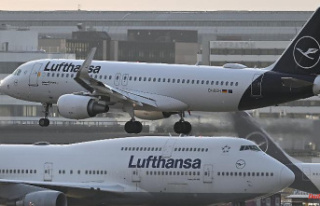Again and again Russia turns on the gas tap. The EU countries are now reacting with an emergency plan to curb gas consumption. The aim is to reduce the risks that could arise from a complete disruption of Russian gas supplies.
The EU states have initiated the decision-making process for an emergency plan to curb gas consumption. At a special meeting of the ministers responsible for energy in Brussels, the necessary majority for the step came together, as confirmed by the Czech EU Council Presidency. The plan is primarily intended to reduce the risks that could arise from a complete disruption of Russian gas supplies.
Federal Economics Minister Robert Habeck of the Greens said earlier at the meeting in Brussels that he was expecting a "strong, unified signal". He emphasized: "We will urgently need this spirit, this unity and this determination in the coming months."
As diplomats previously confirmed, the plan, as proposed by the EU Commission, envisages a voluntary reduction in national consumption by 15 percent between August 1, 2022 and March 31, 2023. In addition, the possibility should be created to trigger a Union alarm in the event of far-reaching supply bottlenecks and to set binding savings targets.
Compared to the Commission's first draft, however, there are significantly more possible exceptions and the hurdles for the introduction of binding savings targets have also been increased. The latter should only be able to be enforced by the Council of Member States and not by the EU Commission. In concrete terms, this means that a Commission proposal for binding savings targets needs the approval of a group of 15 of the 27 EU countries. In addition, these must together make up at least 65 percent of the total population of the Union.
Derogations should provide, for example, that countries such as Cyprus, Malta and Ireland should not be obliged to save gas as long as they are not directly connected to the gas network of another member state. In other countries, for example, efforts to store gas, an impending electricity crisis and the consumption of gas as a raw material for the production of fertilizers, for example, should be able to reduce the mandatory savings.
The current Czech EU Council Presidency justified the many exemptions on the fringes of the energy ministers' meeting. "Different states are in different positions," said the responsible minister, Jozef Sikela. For example, in some countries there were no connecting pipes and some countries still had to do a lot to fill the gas storage facilities sufficiently for the winter. Habeck said about the exceptions that they all have a reason that you can share. But they can also be cause for concern. "The system must not become too cumbersome, there is a certain vulnerability."
According to diplomats, the deliberations of the permanent representatives of the member states showed that the majority of the countries consider solidarity to be extremely important and want to save gas, it said. In addition to Hungary, only three other member states have recently expressed major reservations. Germany supports the emergency plans as one of the countries that are currently still heavily dependent on Russian gas supplies.
Already on Monday evening, Habeck had accused Russian President Vladimir Putin of "perfidious play" because of the announced further reduction in gas supplies. Putin is trying to weaken the great support for Ukraine and to drive a wedge in German society. In return, he stirs up uncertainty and drives up prices. There are no technical reasons for the delivery cuts.
The Russian gas company Gazprom had just announced that it would reduce deliveries through the Nord Stream 1 Baltic Sea pipeline from the current 40 percent to 20 percent of maximum capacity. Only 33 million cubic meters of gas should then flow through the most important supply pipeline to Germany every day. The reason was the repair of another turbine, it said. The EU Commission sees the announcements as evidence of the need for joint European emergency planning. "Yesterday's announcements by Gazprom underscore once again that we must be ready at all times for possible supply bottlenecks from Russia," said Commissioner Kadri Simson.
EU Commission President Ursula von der Leyen recently pointed out that Russia is already only partially supplying gas in twelve member states or not at all. "Therefore, Europe has to be prepared for the worst case: a complete stop of gas supplies, sooner or later," she said. Von der Leyen countered critics of her emergency plans that the effects of a Russian supply stop on all EU countries would be enormous - no matter how much gas they actually get from Russia. "Even member states that hardly purchase Russian gas cannot escape the consequences of a possible delivery stop in our internal market," she explained.
Foreign Minister Annalena Baerbock praised the EU's emergency gas plan as a sign of solidarity in Europe in difficult times. "We are just underlining that we will not allow ourselves to be divided, where we as EU states could also act against each other because gas is so scarce," said the Green politician during a visit to Prague. "We know what our strength is: standing together, especially in difficult times."












